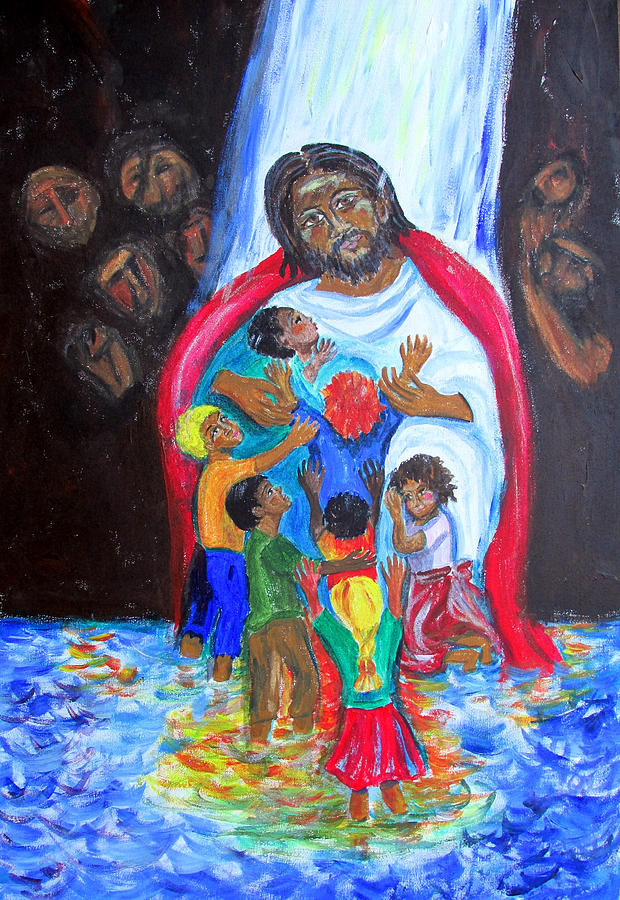In 1938, Congress passed, and President Roosevelt signed into law The Fair Labor Standards Act. Among other things, this law guaranteed a minimum wage, overtime pay, and a forty-hour work week. It also mandated that children in the United States under 16 could longer work in manufacturing or mining during school hours. Prior to this law, children in many states, including Virginia and especially in poorer regions, worked 11–12 hour days in factories and mines, some as young as three years old.
That was only 86 years ago. There are likely people in this church who were born into a country where they could be on an assembly line before they were five. My own grandmother left school at 13 to work in a tobacco factory in order to support her family. Child labor continues to be a serious problem – not just overseas, but in our own backyard. In Virginia, violations continue to increase in the fast food industry, slaughterhouses, and construction, where daily work places children in dangerous environments.
We often equate youth with innocence. You know – kid’s say the darnedest things, playdates, and carefree summers. But, it’s a fairly recent development that children are synonymous with innocence. For the vast majority of our history, children – particularly poor children – have been the face of vulnerability, powerlessness, and in many instances, economic burden. Street urchins, orphans, mouths to feed, guttersnipes – think of Oliver Twist by Charles Dickens and you get the picture.
So, when Jesus takes a child into his arms and tells his disciples that whoever welcomes this child also welcome him and the one who sent him – he’s not talking about embracing a time in their lives when they were innocent and carefree. He’s saying anything but. He’s asking the disciples to embrace a child’s vulnerability and powerlessness.
Let back up. Jesus and the disciples are on the final road to Jerusalem where Jesus will ultimately be crucified. Earlier in the Mark story, Jesus predicted his own death and resurrection, but in the same breath he also claimed the kingdom of God was coming in power. Then Jesus takes Peter, James, and John – leaving the other disciples behind – on a private, mountaintop excursion. There, Jesus transfigures into a dazzling, otherworldly being, the specters of Moses and the prophet Elijah appear, and a voice proclaims from a cloud: “This is my Son, the Beloved; listen to him.”
When the fireworks are over, the four descend the mountain only to find the rest of the disciples fighting off a crowd because they can’t exorcise a particularly stubborn demon from a young man. Jesus chastises everyone in the vicinity – including the disciples – for not having enough faith to banish a simple demon, like you do, and remarkably as the disciples had done many times before. Jesus casts the demon from the man, admits this demon was a bit tougher than other demons, and they all sneak away through Galilee to Capernaum.
On the way, Jesus predicts his death and resurrection once again. And once again, the disciples don’t understand. It makes sense they don’t understand. Jesus has been sending mixed signals. He talks about the kingdom of God coming in power on one hand, and then his execution on the other. You can’t be king if everyone kills you, right?
The disciples are also understandably hesitant to ask for clarification. Last time Jesus spoke about his death, Peter tried to put a kibosh on that nonsense and Jesus chewed him out in front of everyone. He even called him Satan.
Also – remember Peter, James, and John just saw Jesus chatting with the ghosts of Moses and the Elijah in the middle of a talking cloud. And, the other disciples got reamed because they couldn’t cast out a demon.
Look – I know the disciples get a lot of flak for not understanding what Jesus is up to, but in this situation, you have to cut them some slack. I’d be afraid to ask, too.
So, rather than talk to Jesus on the way to Capernaum and ask him what he meant, the disciples talk amongst themselves. They get to Capernaum and Jesus asks, “So what were you talking about?” They don’t want to tell him. Because he already knows. They were arguing about who gets the best seat in the kingdom of God.
In my humble opinion, Jesus caused this problem. He took Peter, James, and John on a special trip up the mountain to see some amazing things they couldn’t talk about. But after you see your teacher turn into an other-worldly being, talk to the forefathers of your faith, and then hear a disembodied voice in a cloud, it’s going to be obvious to the people around you that something big happened and they missed it. The other disciples had to feel left out. Instead of a mountaintop experience with the “in crowd,” they were in the valley messing up a basic demon possession.
So, I can imagine what the conversation was like on the way to Capernaum: Bartholomew looks over and says, “So, what happened on the mountain, guys?”
Peter, James, and John exchange looks. “Uh…Jesus told us not to say.”
“But you can tell us. We’re all disciples.”
“Yeah…. Some of us are more disciple-y than others.”
“What does that mean?”
“Well… Jesus did choose us to go up the mountain for a reason. Pretty sure if we’d been down here, we’d have cast out that demon.”
“Wow. If you three think you are getting the best seats when we get to Jerusalem while we do all the grunt work, you’ve got another thing coming.”
And so on. We know the drill. We’ve heard this argument in every conference room, warehouse, board meeting, classroom, vestry meeting, and at every family dinner table since we were kids: Why am I not first? Why am I not best? Why don’t I get recognized?
The church James wrote to had similar problems: envy for what other people have, jealousy for where other people are in the social hierarchy, people politics. Petty resentment and giant egos fractured the community. We know this story by heart. Someone has what we want – a position, recognition, wealth, power – and we hate them for it. Even worse, we hate ourselves for not being enough to have it.
Think about the messaging you get every day. Every ad, every email, every push notification bombards you with the story that you will be a better person if you have what she has, do what he does, become a member of this club. It’s entirely based in envy and greed. And it’s a lie.
Here’s why it’s so insidious: Envy is based on the perception that having is being. It puts us in competition for our very existence and worth. If Person A has more than Person B, then Person A must be more and Person B must be less.
James says this kind of envy leads to disorder. It leads to division. It leads to murder. It leads to war.
Gee. I wonder if there are any examples today to illustrate this point. Check out any newsfeed. People kill each other every day because they want what the other has and they believe they are less without it.
James’ solution is simple: Don’t do that. He’s very practical in his advice. Do things that bring peace. Be merciful. Let the other person win sometimes. Remember, the world is going to tell you that you aren’t worth anything. But you are. You don’t need another thing or another position or more power. What you need is connection – to God and to each other. Make that happen. It’s something you have to actively do.
However, in his advice to the disciples, Jesus is a little more cryptic: Whoever shall be first shall be last and the servant of all. Whoever welcome a child, welcomes me and the one who sent me. In other versions of this story, Jesus advises us to become like a child – not innocent, but vulnerable, powerless, and utterly dependent on others.
And this is where I have a problem with Jesus. The people living in the margins of our society – people of color, women, LGBTQAI+ communities, disabled persons, those is poverty, and yes, children still – we and they have been without power and a voice for a long, long time. It doesn’t feel right that Jesus asks us/them to become less powerful, more vulnerable, and to serve others. Scripture like this has been used to oppress and spiritually abuse people for millennia.
But then I sat with Jesus’ advice for a while, something else emerged – the realization that our vulnerability is our power.
I watched Brené Brown’s TEDx Talk on “The Power of Vulnerability.” She confirmed what I learned a long time ago: every one of us has a desperate desire to belong. And the only way to belong is to connect. She said that people who are great at making connection tend to embrace their vulnerability.
When we are vulnerable, like a child, we know that we have no control over the outcome of any particular situation. We have no control over what a parent or a sibling or a boss or a spouse or a friend does. We have no control over the economy or our genetics or our trauma.
Vulnerability acknowledges our lack of control. But vulnerability is the courage to connect anyway. It’s the courage to try and fail and be with that failure. It’s the courage to become your authentic self in a world that tries to stop you at every turn. It’s the courage to say you are worthy to be embraced, to be loved, and to be a child of God.
Ask a child at four or five years old if they are a dancer or an artist or a singer, and they will emphatically say, “Yes!” and break into dance or song or draw you a picture. Ask them again a few years later and many will tell you, “No. I’m not good enough. Someone else is better than me.”
Jesus isn’t asking for our innocence in a world that devalues human life. Jesus is asking us to remember that we can dance, we can sing, we can create. By embracing us, Jesus validates our worth and the worth of everyone around us.
Being vulnerable at that level is hard. So hard, y’all. It’s terrifying to know we can fail or be rejected or lose someone or something we love. It’s easier to numb our fear with a glass of wine, a bag of chips, some retail therapy, a little Fortnite or some Netflix and chill.
But here’s the thing – humans can’t just numb one emotion. When we numb our fear and shame, we numb it all. We numb joy, creativity, gratitude, excitement – everything that keeps us connected.
But the promise is this: When we allow ourselves to release control, to step into the discomfort of our own powerlessness, we embrace our full humanity – imperfections, failure and all. Only then can we fully participate in the kingdom of God.
Listen to me. We were meant for hard things. You are worthy of love, just as you are, no exceptions. Not because of any value you bring to a company or your family or a community. You are valuable just because you exist. You belong in this world. You belong in this community. Your job is not to be perfect or to pretend you are someone you’re not or to live a life you hate. Your job is to connect and stay connected.
In this one, big, beautiful life that you have been given, what is it going to take to do that?
Now look around you. We are all children with hopes and dreams and fears and needs. May we all remember that. May we treat each other with kindness. May we hold each other’s dreams and aspirations with gentleness and affection. May we encourage each other. And may we stay connected in a scary world by giving away all the love we can.
Amen.
Sermon preached at St. Thomas Episcopal Church on September 22, 2024.
Scriptures: Jeremiah 11:18-24, James 3:13 – 4:8, Mark 9:30-37



Average Rating